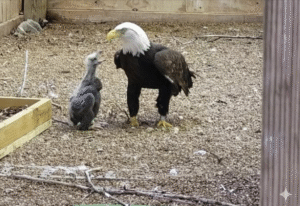Murphy the Eagle: How a Disabled Bird Became a Father
In the heart of Missouri’s World Bird Sanctuary, a story unfolded that captured the world’s imagination — a story not about flight or freedom, but about the unlikeliest form of love and fatherhood. It was the story of Murphy, a bald eagle who couldn’t fly, yet proved that strength and compassion can take wing in the most unexpected ways.
Murphy was not the kind of eagle one sees soaring proudly against the sun. He had been grounded for years, suffering from a permanent wing injury that made flight impossible. For a bird whose species symbolizes freedom and power, such a fate might have seemed tragic. But Murphy’s story was never one of tragedy — it was one of transformation.
At the sanctuary, Murphy was known as a quiet, sometimes brooding bird. While other eagles preened, flew, or called out to one another from their lofty perches, Murphy spent his days on the ground, calm and watchful. Caretakers had grown used to his solitary nature. He wasn’t aggressive, nor was he particularly social. He simply existed — a dignified presence who had made peace with his limitations.
Then, one spring, something remarkable happened. Staff noticed Murphy behaving unusually. He began gathering sticks, leaves, and bits of grass, methodically building what looked like a nest — a curious act for a male eagle living alone. He guarded it fiercely, chasing away any bird who came too close. The sanctuary team chuckled at first. Murphy was nesting, but there were no eggs in sight.
One morning, they discovered what had captured his devotion. In the center of the carefully constructed nest lay a single, smooth, round rock. Murphy had chosen it as his “egg.” He treated it with the tenderness of a devoted parent — nudging it gently with his beak, shading it with his wings, and crying out in warning if anyone approached too near. The other eagles looked on with what might have been curiosity or confusion, but to Murphy, that rock was everything.
The sanctuary staff began affectionately calling it “Murphy’s Rock.” Visitors adored the story, and soon the internet followed. Photos of the proud eagle sitting protectively over his inanimate “egg” went viral. People around the world saw in Murphy something profoundly human — the instinct to care, to love, and to create meaning even in solitude.
What no one knew then was that Murphy’s tender instincts would soon serve a real purpose.
A few weeks later, a violent storm struck the area, toppling trees and destroying several nests. Among the survivors rescued by wildlife officials was a tiny bald eagle chick — orphaned, helpless, and barely clinging to life. The sanctuary took the chick in, nursing it back to health. But the staff faced a dilemma: the baby needed parental care and socialization to learn how to behave like an eagle. Without that, it might never survive in the wild.
That’s when someone had an extraordinary idea — what if they introduced the orphaned chick to Murphy? After all, he had already shown incredible protective instincts with his “rock.” Could he, perhaps, extend that same devotion to a living creature?
The team proceeded carefully. They removed Murphy’s beloved rock from his enclosure — a delicate move that risked upsetting him — and replaced it with a small, fuzzy eaglet. The transition was tense. At first, Murphy looked puzzled, pacing near his nest. He tilted his head, assessing the tiny creature. Then, slowly, he approached, extended his wings, and settled down protectively over the chick. The sanctuary staff exhaled in relief. The match had been made.
From that day forward, Murphy became not just a caretaker, but a father. He fed the chick pieces of fish and small prey brought by handlers, tore them into manageable bits, and carefully placed them in the baby’s beak. He shielded it from the rain and kept it warm through the cool spring nights. When the chick chirped, Murphy responded with low, reassuring calls — a language of comfort and connection that transcended species instinct.
Over the following months, the transformation was astonishing. The once-lonely, grounded eagle found purpose again. He had a family — even if it was just one fragile chick — and that changed everything. The young eaglet thrived under his watchful care, growing stronger and more confident each day.
Sanctuary workers and visitors often gathered silently to watch them. The sight of the flightless father teaching his young one to stretch its wings was profoundly moving. Murphy, who would never know the freedom of the sky again, was raising a bird destined to soar. It was a beautiful, bittersweet symmetry — the grounded nurturing the free.
By late summer, the eaglet was ready for its next chapter. It was moved to a rehabilitation enclosure where it could practice flying and develop the skills needed to survive in the wild. The separation was handled gently, and though Murphy seemed to notice the absence, he did not show distress. Perhaps, in his own way, he understood that this was what good fathers do — they prepare their children to leave.
Murphy’s story became a sensation worldwide, shared on news broadcasts, blogs, and social media pages. People saw in him a message of hope and resilience. Here was a creature who had every reason to retreat from the world, yet instead chose love and purpose. His “disability” did not define him; his compassion did.
Even scientists and behaviorists found Murphy’s actions fascinating. While male eagles do play active roles in parenting, it’s rare to see one show nurturing behavior without a mate or an actual egg present. Murphy’s instincts were so strong that they transcended context — a testament to how deeply ingrained the drive to nurture can be in all living things.
In the months that followed, Murphy continued to live peacefully at the sanctuary. Visitors still come to see him — not as a curiosity, but as a symbol. Children listen to his story and learn that strength doesn’t always mean flight or dominance; sometimes, it means gentleness, patience, and care.
Murphy reminds us that family isn’t defined by blood, and that love often finds its way through the cracks of loss and limitation. He may never soar through the open sky again, but his spirit — and the young eagle he raised — certainly have.
Today, the sanctuary staff lovingly refers to him as “Papa Murphy.” He spends his days basking in the sun, occasionally rearranging sticks in his old nest, and watching over the younger birds nearby. Every so often, he lets out a low, rumbling call — perhaps a song of memory, perhaps of contentment.
Murphy’s life is proof that even when wings are broken, the heart can still rise. His legacy lives not only in the eaglet he nurtured but in everyone who heard his story and saw a reflection of their own capacity for love, perseverance, and purpose.


